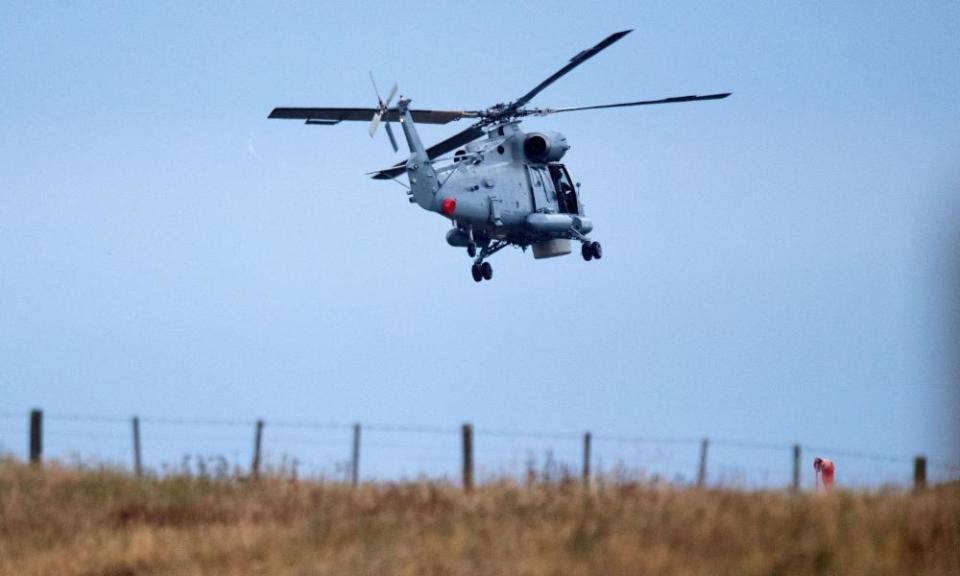White Island volcano: six bodies recovered in military operation

A military operation to retrieve eight bodies from the White Island volcano in New Zealand has been a partial success, with the military retrieving six on Friday. Divers are searching the surrounding waters for the remaining two.
An attempt to recover one body from waters near the island was abandoned due to weather conditions, said police commissioner Mike Bush.
Deputy police commissioner Wally Haumaha told the families six bodies were being taken to the mainland, after a military extraction operation that took several hours went largely to plan.
Related: 'Absolutely heartbroken': families mourn White Island's victims
Eight military personnel, thought to be SAS soldiers, landed on the island just before 8am on Friday, and after two hours the first body was flown by helicopter to a waiting navy ship, the HMNZS Wellington, anchored one kilometre off the island. Over the next hour, five more bodies were safely transported to the ship.
Colonel Ryan Mckinstry said “the conditions were challenging from the point of departure this morning”. “We cannot downplay the risk involved in this operation and I want to acknowledge the efforts for everyone who have placed themselves in dangerous situations today,” he said.
In nearby Whakatāne, families of the victims waited at the marae for news, while locals gathered at the wharf where they had a hazy view of the island.
Joshua Kauta, 70, a Ngati Awa local, told the Guardian he was “extremely relieved” most of the bodies were on their way home, but the operation was “scary” to witness.
“None of this should have happened and it scares me to think of the risks those guys have had to take – anything could happen, she’s unpredictable. She shouldn’t be taken for granted anymore.”
Conditions on the island meant the recovery team had to proceed more slowly than expected, police said, because their heavy protective gear and breathing apparatus was weighing them down.
“The wind direction’s not perfect … [but] the volcano is behaving, the sea has stayed manageable and so all of those things are in our favour at the moment.” Mike Clements of New Zealand police said during the first half of the mission.
Shortly after dawn on Friday about 80 members of the local Bay of Plenty community gathered on the waterfront to sing songs and offer karakia (prayers) for the rescuers’ safe return. Some said they had taken the day off work and intended to remain in place until everyone was back.
“It’s like being here is going to help guide them safely home … just in a spiritual way,” said Dee-Danya Hale-Riddiford, 30.
Related: 'Absolutely heartbroken': families mourn White Island's victims
The level of volcanic tremor remains high, GNS science said, but had declined somewhat overnight, making the rescue mission slightly safer.
Families with loved ones on the island supported the police’s retrieval plan, and whanau could be seen boarding a White Island tour boat before dawn to attend a prayer session one kilometre off the Island before the mission started. Families were accompanied by a senior Australian diplomat, senior New Zealand police officers and tribal leaders of Ngati Awa.
Families returned to port about 8am and were seen hugging and embracing members of the local community on the dock, who had arrived to welcome them with songs, flowers and heart-shaped helium balloons, with the words “I love you” on them.
Clements said the families’ experience at sea was “emotional” but had helped them feel close to their lost loved ones. He said: “They were able to grieve and felt a sense of fulfilment.”
Clements said police had decided they had to act this week, as the chance of another eruption destroying the bodies forever was too great.
He said he had no knowledge of a similar mission being carried out anywhere in the world, but the planning team had taken extensive international advice.
The six bodies are now being flown to Auckland, where they will be examined by the coroner. Many of the victims’ families are heading to Auckland to be near their loved ones.

 Yahoo News
Yahoo News 